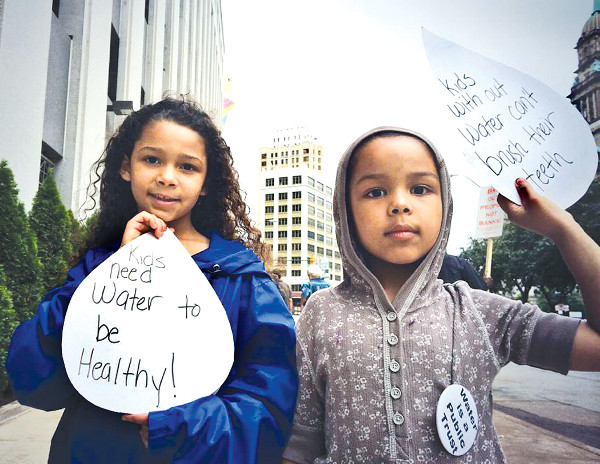
PHOTO: JUSTIN WADE
The People’s Tribune’s Sandy Reid interviewed Sylvia Orduño, an organizer with the Michigan Welfare Rights Organization (MWRO.) The MWRO are among those in the forefront of the struggle to stop the water shutoffs.
People’s Tribune: How many Detroit families are losing their water?
Sylvia Orduño: It’s difficult to get official figures. They were cutting off around 3,000 a week. As a result of national and international coverage and protests, there is now a moratorium on cutoffs until August 25 so customers can sign up for new payment plans. Operations of the Detroit Water and Sewerage Department, formerly under the control of the city’s unelected Emergency Manager, are now turned back over to the Mayor. Public accountability is good, but the problem is not solved.
There are still so many people whose water is not turned back on. People haven’t been able to get into the payment plans which have required large deposits, fines and fees. And, shutoffs continue. Yesterday my husband saw the water department targeting my neighbor’s house. They painted a blue line at the point on the street where you turn off water. My neighbor said, “This is ridiculous. I am behind only 10 days. I was going to pay this week. I only owe $66.” Yet the wealthy, like Mike Illitch, owner of the Detroit Red Wings, was $80,000 behind in his arena’s water bill and maintained his water.
PT: Is there discussion about nationalization, where the government owns the water and distributes it to all who need it?
Sylvia: This crisis in Detroit is starting to awaken people. Some are saying; “We thought this sort of situation only happens in a third world nation.” There are more conversations now about privatization. Companies say they can do it better than public municipalities, but with everything here on the chopping block and put up for privatization, people are taking a second look. The CEO of Nestles claims they (the corporations) have more rights to water than residents. Even as emergency water is distributed to residents, this provides opportunities to discuss how privatization is not a solution and that water should not make a profit for others. It also raises related issues around healthcare, poverty, and about what people who are underemployed or not employed are to do. You still have a right to water. The water department and the Emergency Manager come back with typical reasons such as water may be free but it takes money to get it to your house. We counter these business-minded answers by saying water is basic to life. You can’t put a price on it.
Some horror stories of those without water include seniors with wounds and those with diabetes skin conditions who can’t cleanse. One family didn’t have water for a newborn’s formula. People are living under incredibly difficult situations. We’re trying to get the press to connect these humanitarian stories to the bigger picture of what it means to the whole system we live under. We expect people to have water, housing, food, and all necessities. We’re trying to get the attention of the United Nations. We’ve written to the President and Secretary of Health and Human Services asking them to investigate this health and humanitarian crisis. The privatization effort and the Detroit bankruptcy are highlighting the distinction between the haves and have nots. We cannot tolerate this and will continue to fight for the human right to water.
[sylviaWaterWars]
Water wars in Detroit, MI
Latest
The People’s Tribune opens its pages to voices of the movement for change. Our articles are written by individuals or organizations, along with our own reporting. Bylined articles reflect the views of the authors. Articles entitled “From the Editors” reflect the views of the editorial board. Please credit the source when sharing: peoplestribune.org. Please donate to help us keep bringing you voices of the movement for change. Click here. We’re all volunteer, no paid staff. The People’s Tribune is a 501C4 organization.

